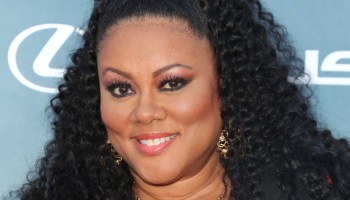VIA: The Guardian
She is a firebrand baptist preacher at the forefront of American black politics, whether speaking at the Democratic National Convention, at which Barack Obama was nominated as presidential candidate, or as one of those chosen to eulogize Michael Jackson at the singer’s star-studded memorial service.
Now Bernice King, the youngest child of Martin Luther King, has a new mission: to revitalize the civil rights organization co-founded by her father as the first woman to lead the Southern Christian Leadership Conference.
In recent years, the SCLC, born as an America-wide grassroots movement at the vanguard of a struggle against racial segregation, has been damaged by infighting and directional drift.
Now the group, which today is a sprawling church-based network of 10,000 members in 17 US states, has turned to King’s daughter to resurrect it.
Bernice King’s election at the weekend, which made her its first female leader, came just weeks after the resolution of a bitter squabble between King’s offspring over management of their father’s estate that led to a public legal battle pitting Bernice and her brother, Martin Luther King III, against a third sibling, Dexter King.
Speaking in a room at Atlanta’s Ebenezer Baptist Church, where her father celebrated his last birthday before his 1968 assassination, King promised to use her family legacy to energize a new generation’s non-violent battle for social justice and to increase the involvement of women.
“I stand before you as a daughter of the civil rights movement calling forth the daughters and sons of the next generation of social change,” said King, who pledged to build a bridge between veteran black activists of the 1960s and the hip-hop generation of the present day. “I am a King, yet I am mindful that I am not the only one.”
Established in the racial storm that followed Rosa Parks’s arrest in 1955 for refusing to give up her seat to a white man on a segregated bus in Montgomery, Alabama, the SCLC was shaped by Martin Luther King as a peaceful campaign for voting rights, housing fairness and opposition to the Vietnam war.
But critics say its mission has become blurred in recent years and divisions have emerged, in particular over its sceptical approach to gay rights.
Among the potential flashpoints for King will be the debate on same-sex marriage. The president of the SCLC’s Los Angeles branch was almost fired last year in a clash with the leadership over his support for gay marriage. King opposes it and has implied that her father would have too, once remarking: “I know deep down in my sanctified soul that he did not take a bullet for same-sex unions.”
Emerging as the most prominent of King’s surviving children, she is a minister at a Georgia church and tours as a motivational speaker. Her website contains a snippet of her speaking “in tongues” and she has confided in congregations that the Holy Spirit revealed to her that her initials, BA King, are significant in meaning to “be a king”.
She is the second sibling to serve as president of the SCLC, following in the footsteps of Martin Luther King III, who headed it from 1997 to 2004 – a tenure widely considered to be lackluster.
Experts say the movement is in desperate need of a spark. “It’s been 20 years since there was a solid hand of leadership,” Ralph Luker, an Atlanta-based civil rights historian, told the Guardian. “It’s drifted enough to make its reason for being altogether unclear.”
Luker said her high profile would help her – but said she was a less unifying figure than her father: “Both in the timbre and in the substance of what she says when she speaks or preaches, her voice seems to be more conservative in substance – and I would say even more shrill.”
An older sister of Bernice, Yolanda King, died suddenly in 2007 at the age of 51. The three remaining siblings faced off in court recently in a disagreement over management of King Inc but reached an agreement to appoint a custodian to run it.
King’s election was secured by a 23-to-15 vote, defeating a former Arkansas judge, Wendell Griffen. Specialists in African American politics said King would need to set out an agenda beyond her family history when she takes up the position in the new year. “She can hark back to her father’s legacy, but she’s going to have to redefine it,” said Andra Gillespie, a professor at Emory University in Atlanta.
“She … is going to have to figure out a way to push that legacy forward so we don’t perpetuate a stagnant, chauvinistic civil rights agenda.”















